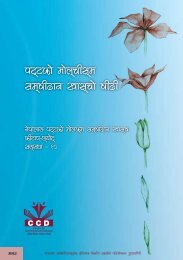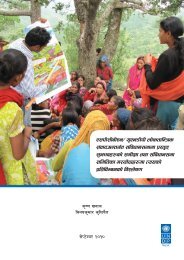English - Support to Participatory Constitution Building in Nepal ...
English - Support to Participatory Constitution Building in Nepal ...
English - Support to Participatory Constitution Building in Nepal ...
You also want an ePaper? Increase the reach of your titles
YUMPU automatically turns print PDFs into web optimized ePapers that Google loves.
3. MAJOR ISSUES<br />
Disagreement with the name of the prov<strong>in</strong>ce: Participants who were not<br />
from ethnic groups seriously objected <strong>to</strong> giv<strong>in</strong>g the prov<strong>in</strong>ce a name<br />
that recognizes the identity of one particular ethnic group. Further, this<br />
recognition also provides them prime rights <strong>in</strong> the prov<strong>in</strong>ce. However<br />
the ethnic participant from Syangja supported the federal arrangement<br />
because, as he said, “There is no alternative <strong>to</strong> accept<strong>in</strong>g the Federal<br />
structure s<strong>in</strong>ce the old mechanism failed <strong>to</strong> address the issues of the<br />
people. We must accept this change.”<br />
TExpectations from the new structure:<br />
People hope that unlike the unitary<br />
system, federalism will provide more local<br />
opportunities and services. Therefore<br />
participants found it difficult <strong>to</strong> realize<br />
that federalism is based on the pr<strong>in</strong>ciple of<br />
<strong>in</strong>terdependence but not self-dependence.<br />
They hesitated <strong>to</strong> accept services like<br />
education, health at easy accessible, no matter<br />
how close, if they were with<strong>in</strong> the adjo<strong>in</strong><strong>in</strong>g<br />
prov<strong>in</strong>ce. Similarly, participants were very<br />
conscious about the decentralization of<br />
power and authority, and concerned about<br />
the centralized fiscal system. However, other<br />
voices provided a rationale for this provision.<br />
Mr. Bhim Karki, UML representative from<br />
Manang stated, “The local <strong>in</strong>frastructure is<br />
not ready for a decentralized fiscal system<br />
and thus the local government must be<br />
empowered while ensur<strong>in</strong>g the provision of<br />
a decentralized system <strong>in</strong> due time.”<br />
Diverse understand<strong>in</strong>g on the right <strong>to</strong><br />
self determ<strong>in</strong>ation: As usual participants<br />
understand the right of self determ<strong>in</strong>ation<br />
<strong>in</strong> various ways, and the ethnic people are<br />
<strong>in</strong>terested <strong>in</strong> obta<strong>in</strong><strong>in</strong>g clear <strong>in</strong>formation<br />
about this right for aborig<strong>in</strong>al people.<br />
However, Khemraj Adhikari the representative<br />
of <strong>Nepal</strong>i Congress from Tanahu argued that,<br />
“If the right <strong>to</strong> self determ<strong>in</strong>ation is provided,<br />
it should be guaranteed <strong>to</strong> all sec<strong>to</strong>rs.<br />
Otherwise there is no use of the right <strong>to</strong> self<br />
determ<strong>in</strong>ation.” The resource person clarified<br />
that there are two extreme op<strong>in</strong>ions about<br />
the right <strong>to</strong> self determ<strong>in</strong>ation: one that does<br />
not support this right for ethnic people at<br />
all, and the other extreme that is <strong>in</strong> favor of<br />
form<strong>in</strong>g separate states through the right <strong>to</strong><br />
self determ<strong>in</strong>ation. Neither of these extremist<br />
views supports build<strong>in</strong>g the nation.<br />
Demand for assurance of Women’s and<br />
Dalit’s rights: Both women and Dalits<br />
demand that their rights be ensured <strong>in</strong> the<br />
federal structure. Khagi Sara Thapamagar<br />
asserted, “Women’s <strong>in</strong>clusion should be<br />
proportional and a reservation of 50% seats<br />
<strong>in</strong> adm<strong>in</strong>istration and education at the<br />
central level and 32% at the local level should<br />
be ensured for 10 years.” The Dalits asked for<br />
compensation for be<strong>in</strong>g exploited by the<br />
state and Mr. Khadga Bahadur <strong>Nepal</strong>i asked<br />
that the practices of discrim<strong>in</strong>ation aga<strong>in</strong>st<br />
Dalits be considered not only as social crimes<br />
but as crimes aga<strong>in</strong>st the state.<br />
Development of M<strong>in</strong>orities <strong>in</strong> federal structure:<br />
The participants want <strong>to</strong> ensure that all m<strong>in</strong>ority<br />
communities have sufficient opportunities <strong>to</strong><br />
develop <strong>in</strong> the ethnic prov<strong>in</strong>ce. Therefore the<br />
participants proposed conduct<strong>in</strong>g actual field<br />
visits before consider<strong>in</strong>g au<strong>to</strong>nomous region,<br />
protective or special area s for any particular<br />
ethnic community. Discrim<strong>in</strong>ation <strong>in</strong> favor of<br />
certa<strong>in</strong> m<strong>in</strong>orities could result <strong>in</strong> cont<strong>in</strong>uous<br />
conflict unless it is based on their actual numbers,<br />
underdevelopment and <strong>in</strong>accessibility.<br />
12 Federalism Dialogues Series 5




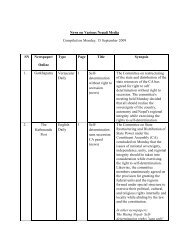

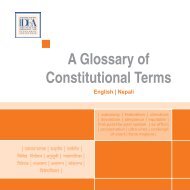
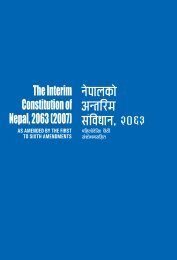
![g]k fnsf blntx? / gofF ;+l jwfg](https://img.yumpu.com/49483602/1/184x260/gk-fnsf-blntx-goff-l-jwfg.jpg?quality=85)
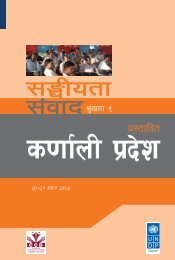
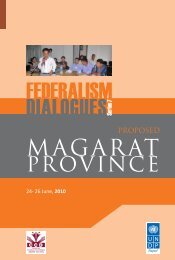
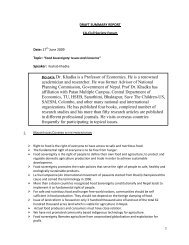
![+ljwfg;ef, /fHosf]k'g](https://img.yumpu.com/41604075/1/184x260/-ljwfgef-fhosfkg.jpg?quality=85)
